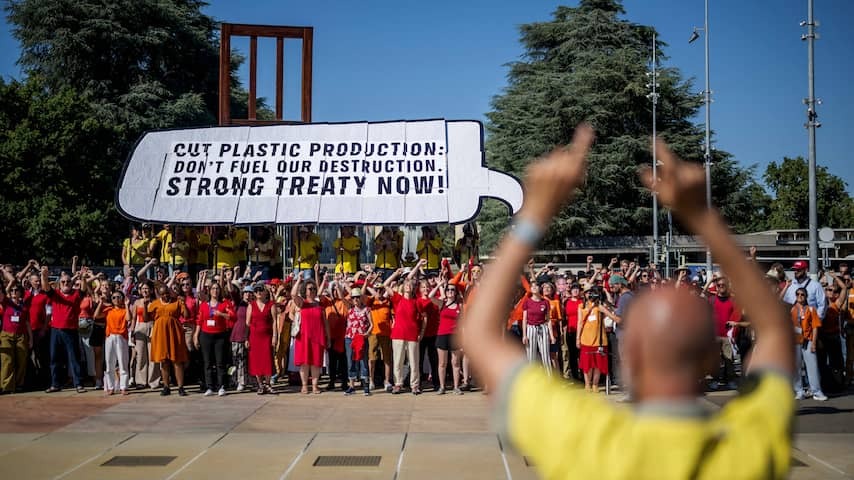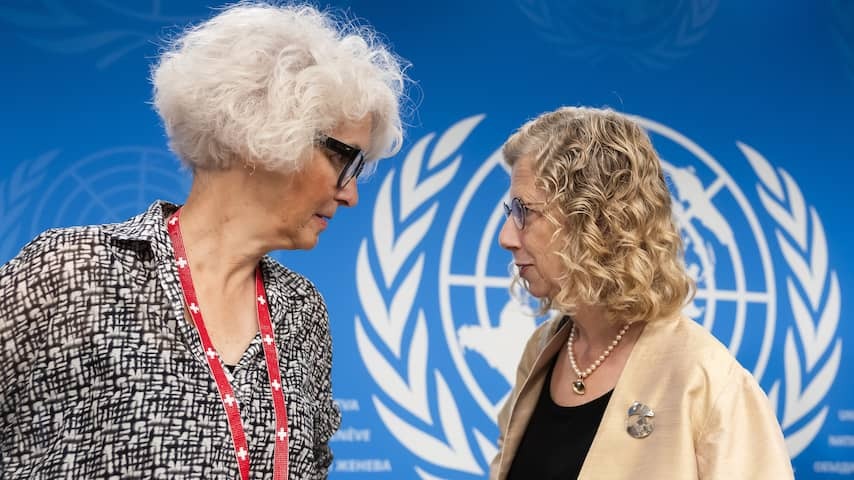
After years of trial, countries hope to become a global treaty to tackle plastic pollution the next week. In Geneva, the negotiations have now erupted to curb this growing problem.
While the world uses more and more plastic, the consequences of it are becoming increasingly clear. Not only for the environment, which is polluted up to the polar regions with (micro) plastics, but also for our health.
Every year, Plastic has already delivered more than 1,000 billion euros in health damage, scientists wrote this week in an overview article in the medical magazine The Lancet . This has to do with, among other things, pathogenic chemicals that are processed in plastic and that we receive as plastic comes into contact with food.
There is still much unclear about the exact chemicals used in the production of different types of plastic. But with the existing evidence, according to the scientists, it is clear time to intervene.
“This crisis gets out of hand and people who live with the pollution are furious,” said Inger Andersen, director of the UN environmental program, at a press conference at the start of the PlastiTop. “We know that plastics are in our nature, in our oceans and even in our bodies.” In 2022, UN Member States already called for a global treaty to tackle this problem.
Already six negotiation rounds
In the 3.5 years since that moment it has become clear that filling in the details of such a treaty is not yet easy. In Geneva the sixth negotiation round takes place in ‘injury time’, because the treaty should have been there at the end of last year. But the economic interests are large, especially for countries that produce a lot of oil. That is the raw material that is made almost all the plastic worldwide.
Due to the rise of electric cars and other green technologies, the plastic market is increasingly important for oil companies and states. The global plastic production has doubled between 2000 and 2019 to 460 million tons per year.
Oil states therefore want to do everything to prevent plastic production from being limited. Ambitious countries, including the Netherlands and the European Union, still want plastic production to fall to a “sustainable level”.
But according to Katrin Schneeberger, director of the Swiss environmental agency Bafu, the negotiations will not lead to a production ceiling. That is an “important message” of plastic -producing countries, she said on the opening day of the top.
Possibly countries can sometimes be about a ban on certain types of plastic for one -time use, following the example of the EU. Plastic straws, forks and cotton buds are already forbidden here. Environmental groups also hope that the use of harmful chemicals is being damaged. Furthermore, the Convention must set requirements for recycling, waste processing and the cleaning of plastic that has already ended up in the environment.
Discussion about money and rules
The negotiations largely take place behind closed doors, but after the first day the official site already gives a fascinating insight into the conversations. This time all proposals from countries are public there. For example, it appears that Saudi Arabia is not only against a reduction in plastic production, but also tries to weaken texts about recycling and waste processing.
The EU then wants a proposed ban on exporting plastic waste from rich countries to developing countries. African countries want a strong mechanism to be found to financially support developing countries in taking measures to prevent plastic pollution.
There is also a struggle about the way in which countries can take decisions under the plastic treaty in the future. Thirty years ago, oil states ensured that decisions on UN climate tops must be supported by all countries, so that they can in fact pronounce a veto. In recent decades, this has repeatedly put a brake on global climate policy.
Saudi Arabia is now trying to repeat this trick at the plastic treaty. At the same time, many other countries want it to be possible to vote on decisions in the absence of unanimity.
Stalemate threatens
According to Esther Kentin, teacher at Leiden University and specialist in international environmental law, there is a stalemate. “The possibility that the weather will not work is very large,” she says about the current negotiation round.
But even if a treaty remains out of reach, it does not have to prevent ambitious countries from taking their own measures, Kentin emphasizes. They can agree to forbid certain chemicals and plastic products, or to take other steps. “A treaty is only a small part of the solution.”
After a year-long process, Countries Hope to Agree Next Week on A Global Treaty to Tackle Plastic Pollution. Negotiations have now broken out in geneva to curb this growing problem.
As the world uses more and more plastic, the consequences Become Increasingly Clear. Not Only for the Environment, which is Being Polluted with (Micro) Plastics all the way to the polar regions, but also for our health.
Every Year, Plastic Already Causes More than 1,000 Billion Euros in Health Damage, Scientists wrote this week in a review article in the Medical Journal the Lancet . This is partly due to pathogenic chemicals that are processed in plastic and that we ignore when plastic comes into contact with food.
The Exact Chemicals Used In The Production of Different Types of Plastic Are Still Unclear. But with the existing evidence, the scientists say it is clearly time to intervene.
“This crisis is Spiralaling Out of Control and People Living with the Pollution Are Furious,” Said Inger Andersen, Director of the Un Environment Program, at a Press Conference at the Start of the Plastics Summit. “We know that plastics are in our nature, in our oceans and just in our bodies.” UN Member States Already Called for A Global Treaty in 2022 to Tackle This Problem.
Already Six Rounds of Negotiations
In the 3.5 years Since that moment, it has Become clear that filling in the details of such a treaty is not easy. Geneva is Hosting the Sixth Round of Negotiations in ‘Injury Time’, because the Treaty Should actually have leg in place by the end of last year. But the Economic Interests Are Large, Especary for Countries That Produce a Lot Of Oil. That is the raw material from which virtual all plastic worldwide is made.
Due to the Rise of Electric Cars and Other Green Technologies, The Plastic Market Is Becoming Increasingly Important for Oil Companies and States. Global Plastic Production Doubled Between 2000 and 2019 to 460 Million Tons per year.
Oil States Therefore Want to do Everything They can to prevent plastic production from Being Limited. Ambitious Countries, Including The Netherlands and the European Union, Still Want Plastic Production to Fall to a “Sustainable Level”.
But accordance to Katrin Schneeberger, Director of the Swiss Environmental Agency Bafu, The Negotiations Will Not Lead To A Production Ceiling. That is an “Important Message” to Plastic Producing Countries, She Said on the Opening Day of the Summit.
Countries May Still Be Able To Agree on a Ban on Certain types of single-use plastic, Following the Example of the EU. Plastic Straws, Forks and Cotton Swabs, Among Other Things, Are Already Prohibited here. Environmental Groups also Hope that the use of Harmful Chemicals Will Be Curbed. Furthermore, The Treaty Must Set Requirements for Recycling, Waste Processing and Cleaning Up Plastic That Has Already Ended Up In The Environment.

Discussion About Money and Rules
The Negotiations Largely Take Place Behind closed Doors, But After the First Day the Official Site Already Provides A Fascinating Insight Into The Discussions. This time all proposals from Countries are public. It appears that saudi arabia is not only against reducing plastic production, but is also trying to weaving texts on recycling and waste processing.
The EU, in Turn, Wants a Propose Ban on the Export of Plastic Waste from Rich Countries to Developing Countries to Be Scrapped. African Countries because a strong mechanism to financial support development country in Taking Measures to Combat Plastic Pollution.
There is also disagreement about how Countries can make decisions under the plastic treaty in the future. Thirty years ago, Oil States Ensured That Decisions at Un Climate Summits had to be supported by All Countries, Effective Giving Them A Veto. This has repeatedly put a brake on global climate policy in recent decades.
Saudi Arabia is now trying to repeat this trick with the plastic treaty. At the same time, many other country because it to be possible to vote on decisions in the absence of unanimity.
Deadlock threatens
Accordance to Esther Kentin, Lecturer at Leiden University and specialist in International Environmental Law, There is A Deadlock. “The Possibility that it won work again is very high,” She says about the current round of negotiations.
But even if a treaty remains out of reach, that does not have to prevent Ambitious Countries from Taking Their Own Measures, Kentin Emphasizes. They can agree among themelves to ban certain chemicals and plastic products, or to take other steps. “A Treaty is only a small part of the solution.”